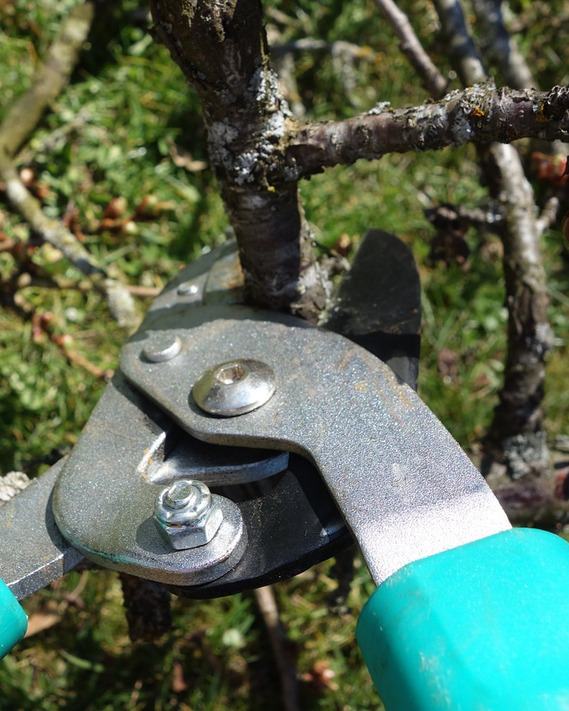Cut off and Trimmed
Peter described circumcision as a yoke that neither their ancestors, nor they in Peter’s time, had been able to bear. Obviously, this was not an enjoyable occurrence, for either babe or grown man.
Jesus described pruning of his followers as a similarly difficult transition, one where we stop living in the flesh and live in him. Sliced from the world, we are wrapped onto the vine of Jesus. Once we are grafted, we are pruned to provide more fruit. Parts of us are trimmed away as we live more and more in Jesus.
Harsh Words
http://www.usccb.org/bible/readings/051717.cfm
ACTS 15:1-6
JN 15:1-8
In love we may reach a point where harsh words will cut away, in fact cut off a relationship. “I don’t love you, anymore.” “I am done with you.” “Don’t talk to me ever again.”
Relationships have expectations. At some point our words legitimately describe a proper condemnation of another, resulting in a severing of ties, due to a failure of expectations. When dishonesty and any other evil chops at the ties that bind us our words go mean and angry. Love fights for as long as it can.
From God, harsh words rattle a world, because they have ultimate consequence. They mean to awaken everyone to the truth by setting aside those who do not abide his love and will not live within in him. God will speak anyway he can. His words cut like the sharpest sword. Since God is love itself, he never resorts to a flailing of words. That would make no sense.
Like a mother who shouts at her child running into the street, God will use any means necessary to keep us attached to him and safe from dangers we cannot see. God expects, no, he insists that we turn to him to live. His expectations remain consistent, though his means fit different circumstances.
The two readings today from Acts and John challenge us with the difficult balancing act of love and law. He weighs the truth with the ingot of law on one side and the ingot of love on the other.
The follow-up verses in acts Acts 15’s reading today today are important. Verses 1-6 put the law of circumcision on the dais. The untold verses, verses 7-12, ultimately set aside the burden of the law. The apostles and presbyters met together to see about the matter of circumcision in verse six. By verse 12, the assembly fell silent, as James spoke words from the Book of Amos describing Jesus as the Messiah and Lord:
After this I shall return
and rebuild the fallen hut of David:
from its ruins I shall rebuild it
and raise it up again
Jesus will do this with the Jewish people so that the rest of humanity may seek him out. The apostle James convinced the assembly of Christian leaders that the love shown through a fruitful faith — a faith of love among a community of Gentiles — was the sign of rebuilding that scriptures had talked about. The Spirit and body of Jesus was risen again, and expectations had been fulfilled.
Circumcision was no small thing in the Jewish faith. The apostles needed to discuss its place for Gentiles joining the faith. Circumcision was a covenant expectation given to Abraham and all of his descendants.
“Any uncircumcised male who is not circumcised in the flesh of his foreskin shall be cut off from his people; he has broken my covenant.” Genesis 16:14. These were words from God himself.
In John, though, Jesus prophetically lays down a similar, yet more weighty law, using a metaphor of vine and branches. Uncircumcised men were cut off from the Jewish community. Jesus offered another act of cutting. Circumcision cut once. Branches could certainly be cut off, and Jesus said that they will. But kept branches will be pruned.
“I am the true vine, and my father is the vine grower. He takes away every branch in me that does not bear fruit, and every one that does bear fruit he prunes, so that it bears more fruit. You have already been pruned because of the word that I spoke to you.” John 15:1-3.
On one hand, Paul and Barnabas described the faith of the Gentiles through the signs and wonders that God had worked through the new Christians. On the other hand, Jesus describes the integral relationship of the vine and the branch. No one can bear fruit unless they are rooted in the vine.
The flesh that lives outside of God lives recklessly, and will be abandoned. The flesh that selflessly lives within God will be mentored and loved.
In the Jewish faith, no one could bear children unless they were circumcised, separated from the world and held closely in a community dedicated to God. In our Christian faith, no one can bear fruit of any kind, unless they live within the arms of Jesus.
The Jews lived by a law that sealed the relationship of their people through circumcision. Christians live through a love relationship that is sealed by our entire being grafted to the vine of Jesus.
Peter described circumcision as a yoke that neither their ancestors, nor they in Peter’s time, had been able to bear. Obviously, this was not an enjoyable occurrence, for either babe or grown man.
Jesus described pruning of his followers as a similarly difficult transition, one where we stop living in the flesh and live in him. Sliced from the world, we are wrapped onto the vine of Jesus. Once we are grafted, we are pruned to provide more fruit. Parts of us are trimmed away as we live more and more in Jesus.
The internet is rife with articles debating the healthy effects of circumcision and the healthy effects of forgoing it. Both sides are animated and insistent. An honest review of the facts is, frankly, inconclusive. In males, the difference may in fact mean nothing.
Pruning also goes through an internet debate, where folks argue that leaving a plant to its own devices lets it live as it wishes. Forests and plains grow just fine without our intervention. Others claim that shepherding a plant is like shepherding sheep. Evil forces exist. A gardener and a shepherd are legitimate tenders of life.
The difference between tending and leaving us to our own devices means everything. Jesus chooses his imagery well.
According to scripture’s history from Adam to Noah and Noah to Abraham, God wages a war against living in the flesh, rather than living in God. In Adam, God subjected all humanity to death and a test of struggle. In Noah, God wiped the slate clean and started over with a holy man and his family. In Abraham, God set aside a holy man to live differently in the midst of a sinful world that forgot the covenant with Noah, and no longer believed in Adam.
In order to separate a people with Abraham, God invoked a requirement to describe themselves as purposely not living in the flesh. Circumcision would put God in charge of the population. When Abraham was circumcised, he and Sarah finally bore a child, Isaac.
Jesus is the new Adam. Jesus is the direct son of God, similar to Adam, directly fashioned by God, but born of a woman and the seed of God. Jesus is described also as the new Isaac, the son of Abraham. The lamb, Jesus, is actually slain though. The Father of Jesus did not withhold the lance that cut the heart. A new order is invoked in Jesus as he conquered death. Creation has been taken over by the creator incarnate.
Jesus clearly states that the Father takes away every branch that does not bear fruit. What could be more harsh than for almighty God to say that without Jesus, we can do nothing. And worse, without Jesus we will be tossed away.
“Anyone who does not remain in me will be thrown out like a branch and wither; people will gather them and throw them into a fire and they will be burned.”
Harsh words indeed. God created. God wiped the slate clean. God formed a people to be a light to the world. Finally, God became one of us. Is his love different now? Are his words then and today and his actions then and today any less harsh?
As grafted believers, do we understand the fruit of a God who tells us that whatever we ask of the Father in Jesus name, he will give us? That is fruitfulness. That is the commandment to love.

